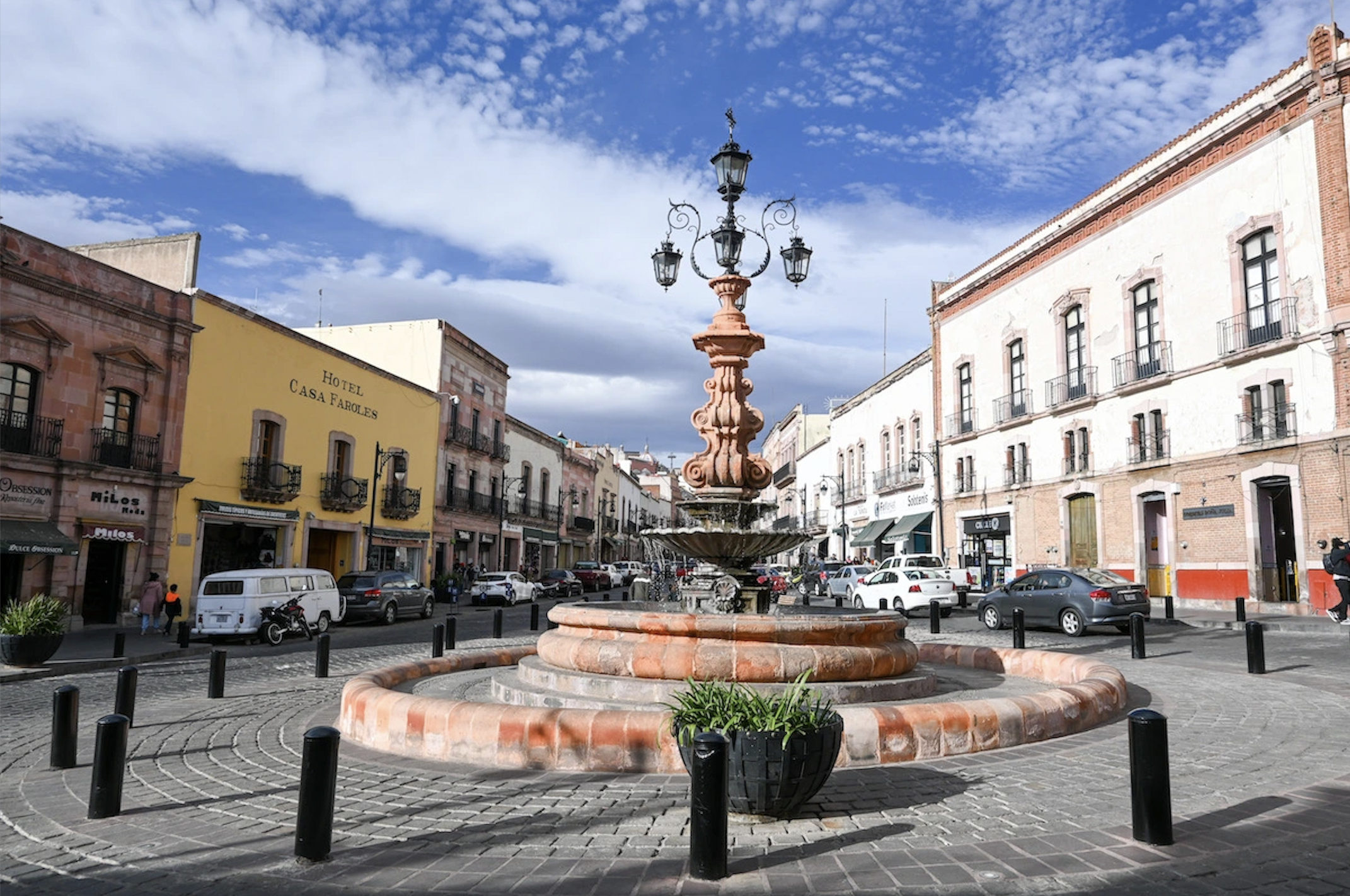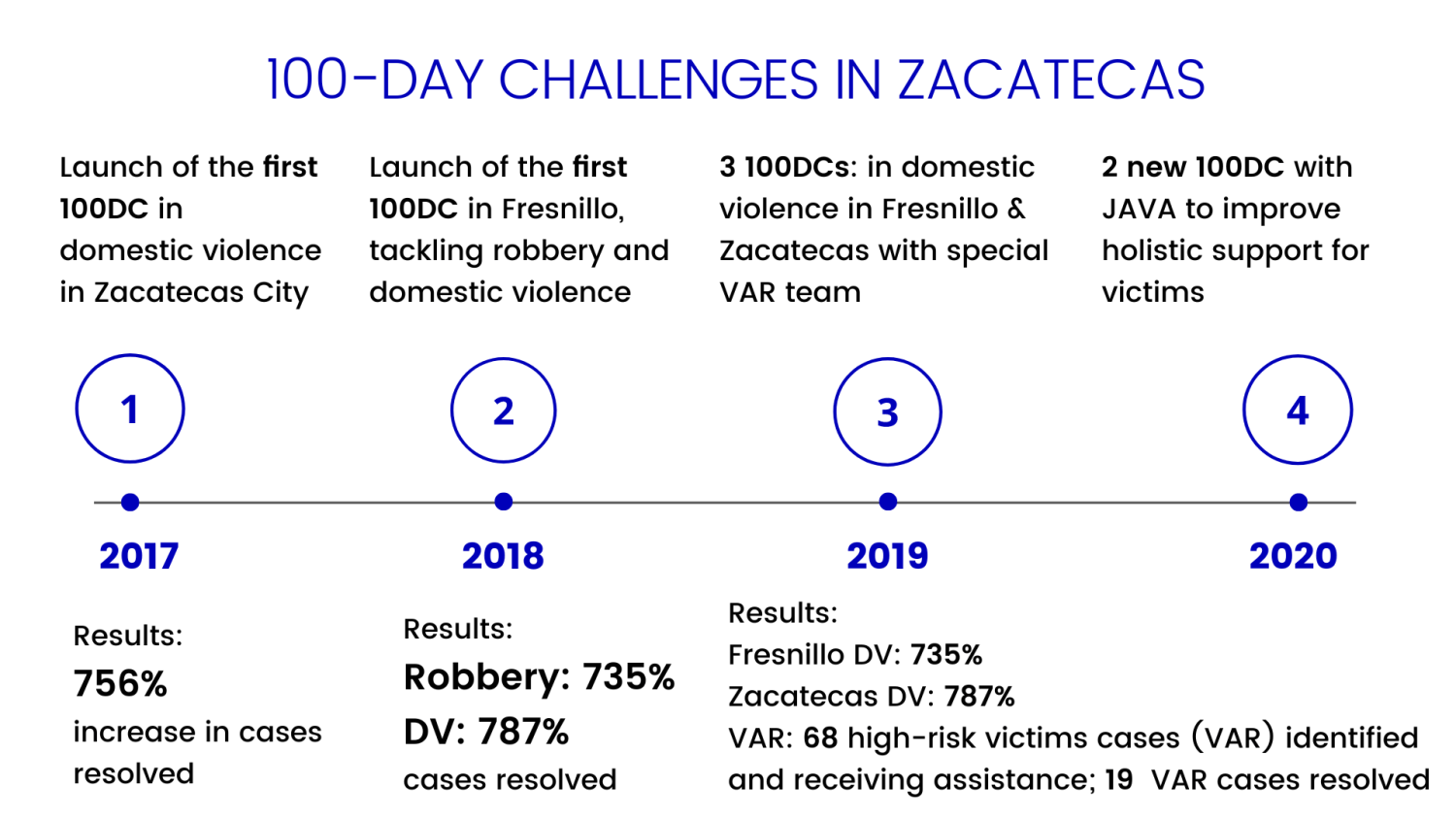
RE!NSTITUTE has worked with Zacatecas’ government institutions, civil society organizations, and the private sector since 2017 to improve the Criminal Justice System’s (CJS) response to the crimes that most impact society. Over the course of four years, we have seen countless innovations and best practices emerge; from new alliances and relationships that have endured the test of time to the creation of a specialized unit to improve victims’ safety. We are very fortunate to be able to continue collaboration with the CJS of Zacatecas so that systemic change is sustained and justice reaches all victims.

We launched the first 100-Day Challenge in collaboration with the United States Agency for International Development's (USAID) Promoting Justice Project (Projust) in the judicial district of Zacatecas to improve the system's response to domestic violence cases. This Challenge sparked several major changes in key processes and an impressive increase in inter-institutional collaboration. In addition to measuring the primary indicator (cases resolved), the frontline team began monitoring hearing times to increase efficiency - key for increasing the likelihood of victims following through with the criminal process and decreasing re-victimization:
The average number of hearings held per case dropped dramatically: from six hearings per case before the Challenge to only two hearings per case during the Challenge.
- A 33% reduction in initial hearings: from an average of 90 minutes before the Challenge to 60 minutes during the Challenge.
- The average time to close a case from the moment charges are pressed to resolution was reduced by 50%, from 90 to 45 days.
- This 100-Day Challenge resulted in a monumental 756% increase in the number of domestic violence cases resolved when comparing the baseline to the final number of cases closed in just 100 days.
During the second wave of 100-Day Challenges with Projust, we worked with local institutions and organizations in the city of Fresnillo, Zacatecas, to improve case disposition rates for two crimes: robbery and domestic violence. Both frontline teams surpassed expectations and achieved some spectacular results:
Robbery:
- 735% increase in the number of robbery cases resolved
- Two local criminal organizations were dismantled using crime analysis techniques
Domestic Violence:
- 787% increase in the number of domestic violence cases resolved
- Creation of violence prevention and victims' assistance plan, as well as the implementation of crime analysis techniques to identify hot spots
During the Challenge, the domestic violence team set out to establish a new specialized unit in response to the problem of the lack of oversight and enforcement of protection measures for victims. The unit is responsible for monitoring and helping enforce these protection measures (i.e., restraining orders, among others) to ensure victims' safety, with the overarching goals of neutralizing violence and preventing femicides. The unit continues to operate today and now has 31 full-time staff members dedicated to prioritizing the safety of victims suffering from domestic abuse.
Another innovation for the team in Fresnillo was the implementation of crime prevention strategies with the help of the municipal police to identify high-incidence areas or 'hot spots' for domestic violence. This information was then strategically used to boost police patrols in identified target areas at specific times for a more efficient and timely response to reports of domestic violence.
During the third and final round of 100-Day Challenges with Projust, we once again focused on cases of domestic violence in both Fresnillo and Zacatecas City, this time with a third frontline team specializing in identifying and intervening specifically in those cases where a victim was at a high risk of escalating violence that could lead to femicide - referred to in Spanish as víctimas de alto riesgo (VAR).
This time, the Challenge was even more complex, as all teams integrated a victim-centered approach and gave precedence to identifying and resolving priority VAR cases. At the start of the Challenge, the VAR team identified several problem areas in how these cases were processed. These problem areas gave rise to innovative solutions, including a completely new method for the identification of high-risk victims through 911 calls to guarantee a swift response from police and the imposition of protection measures for the victim.
The 100-Day Challenge also prompted an important legislative reform to change the way domestic violence cases are processed: from querella (a criminal complaint filed by the victim that can only proceed with the victim's consent and participation in the process, unless in cases where a weapon is used or there is a history of repeated offenses) to oficio (the prosecution is obliged to act without the victim's involvement in the criminal process).
This legal technicality (querella) makes it challenging to provide adequate support for victims as, in many cases, the aggressor pressures and sometimes forces the victim to desist and present a pardon - with this act, the legal process ends, the case is dismissed and the victim remains at risk. For this very reason, the team presented the reform proposal to the Attorney General of the State, Francisco José Murillo Ruiseco, who consequently took on the task himself of seeking its approval before the State Legislature. Due to the COVID-19 pandemic, the reform proposal is still in the approval process; however, we expect it to be formally approved in the coming months.
The frontline team addressing the more common and less urgent domestic violence cases in Fresnillo (those that can be resolved through alternative legal mechanisms and do not require a trial) consolidated a never-before-seen alliance between the police (SSP) and the Pre-Trial Services Unit (UMECA, Spanish acronym) to provide comprehensive supervision to defendants. This alliance catalyzed an outstanding result:
- 0% recidivism rate during the 100-Day Challenge for the 102 defendants under supervision for domestic violence offenses in Fresnillo.
By the end of the Challenge, the Fresnillo team increased efficiency by 65%, while the Zacatecas team increased by 29%. The specialized VAR team closed 19 high-risk cases and identified and provided support to 68 priority cases.
The innovations and process changes implemented by teams across Zacatecas during these last four years have had a lasting impact. The 100-Day Challenge is well known across the state, and participating justice operators have experienced a significant transformation in their daily work. Processes are more efficient, there is less bureaucracy, waiting times for victims have decreased, police and prosecutors work together to protect the lives of women, and system leaders have shifted to a results-based approach - while continuing to drum up new ways in which the 100-Day Challenge can be used t0 garner tangible and lasting results.
Through USAID's JAVA and ConJusticia programs, we continue to work with the justice system in Zacatecas today to strengthen the Criminal Justice System and the institutions that provide essential services to victims and the accused.
- Gender
- Justice
- Gender
- Justice
